Miracle /ˈmirək(ə)l / noun: a marvelous, highly improbable or extraordinary event that brings very welcome consequences. via Old French from Latin miraculum ‘object of wonder’, from mirari ‘to wonder’, from mirus ‘wonderful’
It had to be that day, at that time. Not two days before, as originally planned. The entire trip was for this purpose, so we wanted to go as soon as possible. But four days in Palermo had taken its toll and a rest was desperately needed. We felt better the next day, but the next day was Sunday and Sunday is always a good day for a scenic drive and an afternoon by the sea.
We prepared ourselves for Monday. Everyone was ready early. Except that I needed to stop for a coffee. And a coffee in Italy means a full stop. You don’t take it to go. The other three stayed in the rental car, two crammed in the back with the windows down as the heat and humidity moistened their skin, and I went inside the bar to enjoy a cappuccino. There I bumped into the local mechanic who had recently helped me, who then introduced me to his wife, and we chatted about the painting being done to our house. This is how breakfast is done in Sicily. One coffee, even standing at the bar, takes time. You don’t rush things in Sicily.
You can’t plan miracles.
Every small delay mattered. But we didn’t know that at the time. The stop to change drivers when we exited the autostrada before scaling the mountain in switchbacks. The stop at the memorial for those killed in the 1947 massacre, which had been so riveting to us last year but seemed somewhat forlorn outside of the May 1st anniversary. The missed turn, circling us around the perimeter of town, making our destination seem much farther away.
Without each delay, would any of what happened, have happened?
We went to the cemetery first. Not into town. Not to the church. Not to the bar famous for its cannoli. Instead, we started with the dead, hoping they would lead us to the living.
You might say they did. Or you might say it was the older Sicilian man who spoke a little English who was our intermediary. He was the angel we didn’t know we needed.
If it weren’t for all the delays, this man may not have been there, slowly walking towards the gate. He would have been somewhere deep inside the cemetery, visiting someone he loved. He wouldn’t have noticed me or heard my voice, bouncing softly off the stones, and stopped to ask if we were English.
No, we’re American, I told him in my stumbling Italian. But the family of my cousin’s wife comes from here and we are trying to find some relatives.
Please, you can speak in English, he said. I know some English.
And this, dear reader, was a miracle in itself. In a small Sicilian town, with a rich history and its own language, we met someone who spoke some English. Someone who overheard us and offered to help.
If we hadn’t arrived on Monday, at the time that we did, there may not have been a funeral. In a town of only 6,200 people, how often can you expect a funeral? This one was simple: one black hearse, followed by twenty or so mourners on foot. A funeral requires the groundskeeper to be present. And the groundskeeper turned out to be key. But first, this elderly local man who spoke some English had to be there to greet me, and then to convince the groundskeeper to leave his duties momentarily and meet with us.
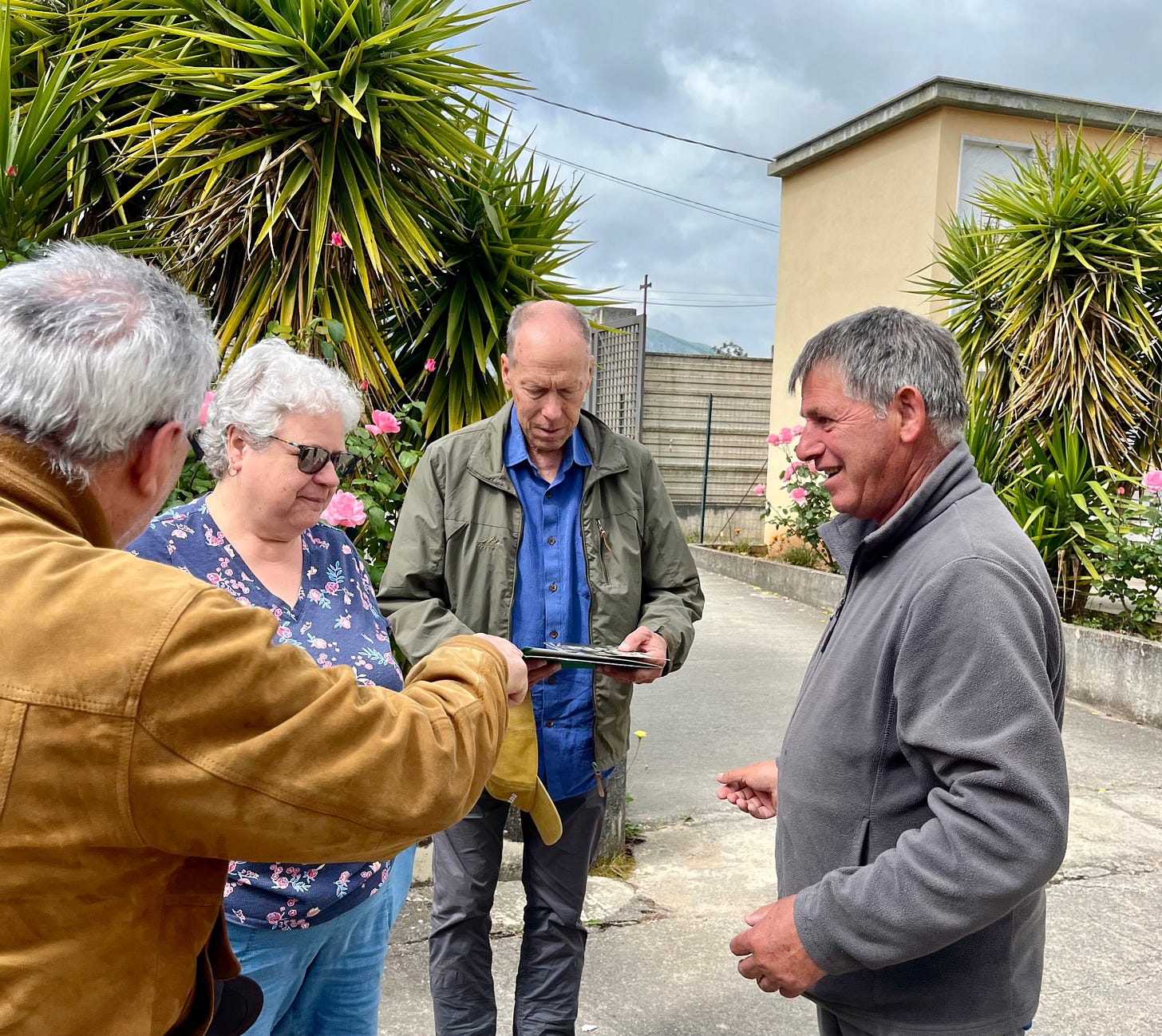
Salvatore, the groundskeeper, only speaks Sicilian or Arbëresh, the language of Piana degli Albanesi. This alpine town, high above Palermo, was founded in the late 1400s by Albanians who fled the Ottoman Empire that had taken over their country. For over 500 years, they have kept their customs and their language alive and remain relatively secluded from the rest of the world.
My beginner’s Italian was better than nothing but if left on my own, I would have floundered. Mary knows some Arbëresh words, but nothing that can be strung together into a sentence. But we had, for a few minutes, this angel of a man who introduced us to Salvatore. And we had photos. Photos that we hoped would be worth more than words.
We told Salvatore that we were looking for Fabbianos. That’s all we had. No first names, no dates. Salvatore told us, with just a bit of curiosity, I am a Fabbiano.
Ah, sure, I thought. Of course you are. The town is probably filled with Fabbianos. As many Fabbianos as there are Smiths in any U.S. phone book. I didn’t say this, of course. I only smiled and gasped with some surprise. Wait here, he instructed us. He had to attend to the funeral. The local man who introduced us smiled with satisfaction as his wife tugged on his sleeve. They left, and we waited.
All we could do is wait.
And enjoy the roses. Such abundant, fragrant roses!
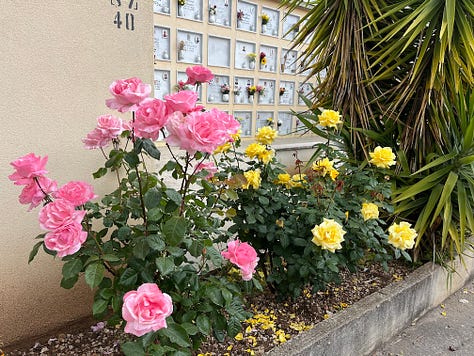
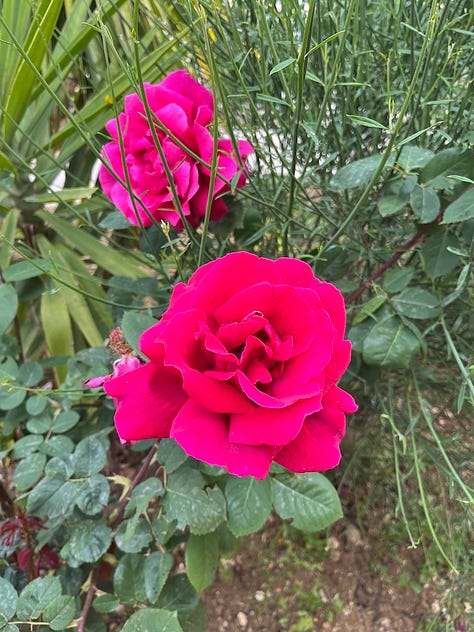
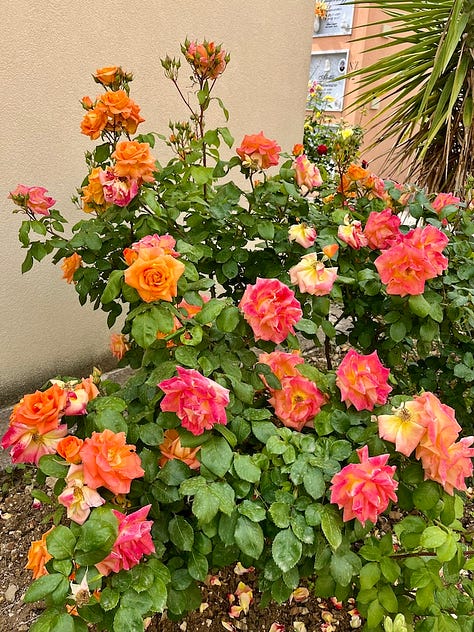
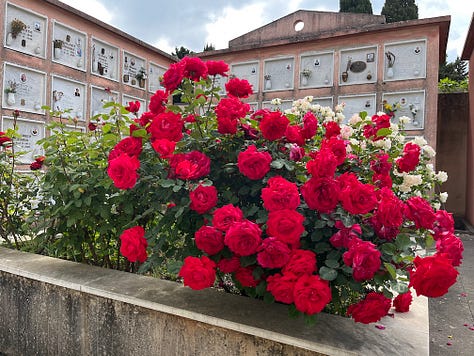

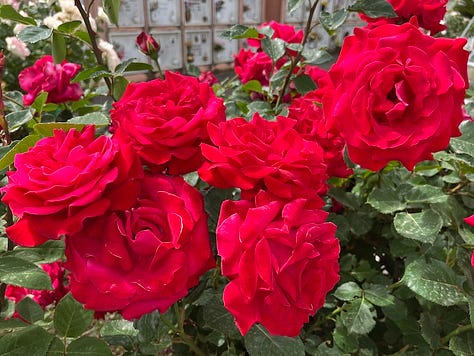
I left the others and looked around.
Once I found the older part of the cemetery, where it had been suggested Mary’s family might be, I lost a bit of hope. How could we ever find someone here? If the family had all moved to the States, who would have looked after the graves?
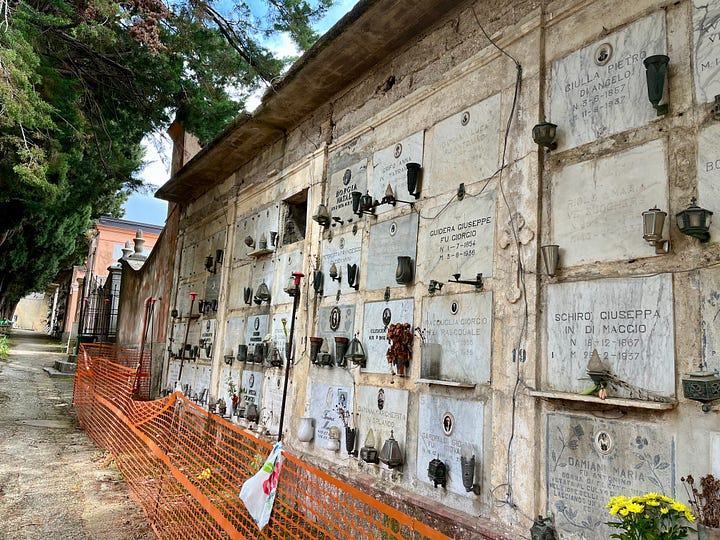
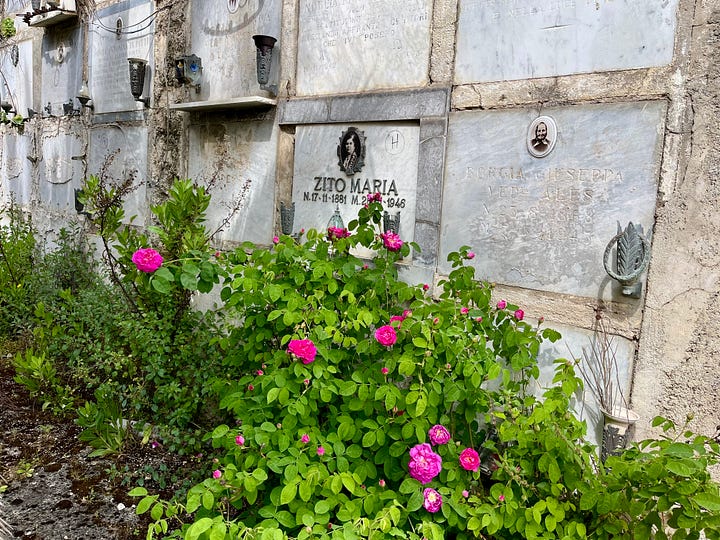
Mary married a German, my cousin, but her Sicilian blood was always prominent. She remembered bits of the language, Arbëresh. She made cannoli and other specialties she learned in childhood.
For decades, Mary had dreamed of going to her homeland, the place which her “Nonnie” had left. After Tom and I bought a house in Sicily, it seemed the stars were aligning. Two years later, she and my cousin purchased tickets for their first trip abroad. Mary came in search of her roots. But with only a family name and a few photos, what were the chances she would learn anything?
I grew up in Chicago and for decades when I would mention this, inevitably someone would say, “Oh, I know someone from Chicago!” As if it were a small town and there was some possibility that we had been neighbors. Sure, Piana degli Albanesi is not Chicago. It is a small town. But it was over 100 years ago that her grandfather left. Really, what were the odds that we would find Mary’s family?
How many things need to line up for a miracle to occur?
Stay tuned for Finding Family in Sicily: Part 2 . . .



I really enjoyed this. Great pictures and the roses are beautiful- just the colors alone are spectacular. Can't wait to read part 2 and I'm glad I'm reading them together!
I love this story Jan! I'm looking forward to the remainder!